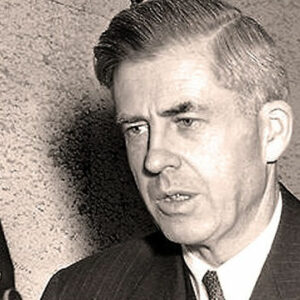Henry A. Wallace was an American politician and agrarian expert who served as the 33rd Vice President of the United States in Franklin D. Roosevelt’s administration from 1941 to 1945. Wallace began his career as a novelist and editor before working in the hybrid-corn industry before becoming agricultural secretary and subsequently Vice President during Roosevelt’s third term. Wallace was born in Iowa and took over his father’s post as editor of the family publication after finishing college. After joining the Democratic Party, Roosevelt nominated him Secretary of Agriculture. Wallace received national notoriety as the head of the Agriculture Department for skillfully organizing the administration of the Agricultural Adjustment Agency, and Roosevelt chose him as his running mate in the 1940 elections. Wallace earned a reputation as a dependable and hardworking wartime vice president during the following four years, but he was unable to reclaim the nomination in 1944 and was rejected by an increasingly conservative Democratic party. He was then named Secretary of Commerce before being fired after publicly criticizing President Truman’s international policy. Following that, he returned to editing and utilized his publication to promote progressive politics, resulting in the formation of the Progressive Party. Following that, he ran as the presidential candidate for the newly created party but was unsuccessful, and Wallace left politics soon after. After retiring, Wallace continued to write about politics and agriculture until his death.
Childhood and Adolescence
Henry Agard Wallace was born in Iowa, United States, on October 7, 1888, to Henry Cantwell Wallace, a farmer, newspaper editor, and novelist who later became Secretary of Agriculture, and his wife, Mary Brodhead, a very pious woman with a background in music and painting.
Wallace earned his bachelor’s degree in animal husbandry from Iowa State College in 1910. Following that, he started working at Wallaces’ Farmer, a family-owned newspaper that his father and grandfather launched.
Wallace was on the editorial staff of the Des Moines magazine from 1910 until 1924. Following that, he became the magazine’s chief editor, a post he held until 1929.
Henry Wallace’s Career
Henry A. Wallace’s family was a staunch Republican supporter, but Wallace was dissatisfied with the party’s agriculture policies and tariff policies, which were fiercely protectionist. As a result, he left the Democratic Party in 1928.
Wallace later joined the Democratic Party and was instrumental in the Democrats’ 1932 election triumph in the conservative state of Iowa. Because the Democratic Party ran in the 1932 elections with a radical New Deal agenda to combat the Great Depression, and Iowa was considered a conservative state, the victory in Iowa was noteworthy.
Wallace was appointed Secretary of Agriculture during Roosevelt’s first two administrations after his influence to the Democratic Party’s triumph and his expertise in agriculture were recognized. Wallace served as the United States Secretary of Agriculture in President Franklin D. Roosevelt’s administration from 1933 to 1940.
When Roosevelt decided to run for a third term in office in 1940, Wallace was chosen as his running mate.
Wallace was then elected and served as the 33rd vice president of the United States in Franklin D. Roosevelt’s Democratic administration until 1945.
Wallace served as the President of the United States’ goodwill ambassador to Latin America, traveling to Siberia and China. When the United States entered World War II, Wallace took on a variety of extra emergency responsibilities, including national economic concerns.
In 1944, Wallace’s re-nomination for vice president was met with opposition from numerous conservative Democrats, and he was replaced on the ticket by Senator Harry S. Truman.
Wallace was appointed Secretary of Commerce by Roosevelt in March 1945, and he remained there until September 1946. Wallace was removed from the cabinet due to growing public displeasure with President Truman’s hard Cold War policies toward the Soviet Union.
He became the editor of the liberal weekly journal ‘The New Republic’ in 1946 and stayed there for a year.
He utilized his journal to criticize Truman’s foreign policies and promote his own progressive agenda.
He then founded the Progressive Party and stood for president of the party in the 1948 elections, but was unsuccessful. Wallace lost to Truman in a landslide and later left the Democratic Party, effectively retiring from politics.
Wallace was also a prolific writer who continued to publish works on politics and agriculture after his retirement. ‘America Must Choose’ (1934), ‘The Century of the Common Man’ (1943), ‘Sixty Million Jobs’ (1945), and ‘The Long Look Ahead’ are some of his writings (1960).
Henry’s Major Projects
Wallace was an agrarian expert whose studies with higher-yielding corn lines resulted in substantial discoveries in plant genetics, which he then turned into a hugely profitable hybrid-corn enterprise.
He drafted and supervised New Deal legislation as Secretary of Agriculture, including the Agricultural Adjustment Act of 1933. Wallace was successful in designing the government’s agriculture policy, which was aimed to advance and stable farm prices, conserve soil, and stock reserves, and regulate production.
Personal History and Legacy
Wallace married Ilo Browne in 1914, and the couple produced three children. Wallace and his wife helped him start the immensely profitable Hi-Bred Corn Company in 1926.
Wallace died on November 18, 1965, in Danbury, Connecticut, after suffering from amyotrophic lateral sclerosis. His ashes were buried in Glendale Cemetery in Des Moines, Iowa, after he was cremated at Grace Cemetery in Bridgeport, Connecticut.
Estimated Net worth
Henry is one of the wealthiest politicians and one of the most popular. Henry Wallace’s net worth is estimated to be $1.5 million, according to Wikipedia, Forbes, and Business Insider.


